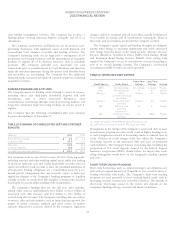American Express 2013 Annual Report Download - page 32
Download and view the complete annual report
Please find page 32 of the 2013 American Express annual report below. You can navigate through the pages in the report by either clicking on the pages listed below, or by using the keyword search tool below to find specific information within the annual report.
AMERICAN EXPRESS COMPANY
2013 FINANCIAL REVIEW
TABLE 12: ICS SELECTED STATISTICAL INFORMATION
As of or for the Years Ended December 31,
(Millions, except percentages and where indicated) 2013 2012 2011
Change
2013 vs. 2012
Change
2012 vs. 2011
Card billed business (billions) $ 131.7 $ 128.9 $ 124.2 2% 4%
Total cards-in-force 15.7 15.6 15.3 1 2
Basic cards-in-force 10.7 10.6 10.5 1 1
Average basic Card Member spending (dollars)*$ 12,429 $ 12,221 $ 11,935 2 2
International Consumer Travel:
Travel sales $ 1,420 $ 1,372 $ 1,324 3 4
Travel commissions and fees/sales 6.9% 7.2% 7.8%
Total segment assets (billions) $ 31.1 $ 31.8 $ 29.1 (2) 9
Segment capital $ 3,132 $ 2,875 $ 2,840 9 1
Return on average segment capital(a) 20.9% 21.8% 25.8%
Return on average tangible segment capital(a) 38.8% 43.0% 49.8%
Card Member receivables:
Total receivables (billions) $ 7.8 $ 7.8 $ 7.2 — 8
90 days past billing as a % of total 1.1% 0.9% 0.9%
Netlossratio(asa%ofchargevolume) 0.20% 0.16% 0.15%
Card Member loans:
Total loans (billions) $ 8.8 $ 9.2 $ 8.9 (4)% 3%
30 days past due loans as a % of total 1.4% 1.5% 1.7%
Net write-off rate – principal only(b) 1.9% 1.9% 2.7%
Net write-off rate – principal, interest and fees(b) 2.3% 2.4% 3.3%
Calculation of Net Interest Yield on Card Member Loans:
Net interest income $ 757 $ 745 $ 769
Exclude:
Interest expense not attributable to the Company’s Card Member loan portfolio 93 102 125
Interest income not attributable to the Company’s Card Member loan portfolio (29) (25) (38)
Adjusted net interest income(c) $ 821 $ 822 $ 856
Average loans (billions) $ 8.5 $ 8.7 $ 8.8
Exclude:
Unamortized deferred card fees, net of direct acquisition costs of Card Member
loans, and other (billions) (0.2) (0.2) (0.1)
Adjusted average loans (billions)(c) $ 8.3 $ 8.5 $ 8.7
Net interest income divided by average loans 8.9% 8.5% 8.8%
Net interest yield on Card Member loans(c) 9.9% 9.6% 9.9%
* Proprietary cards only.
(a) Return on average segment capital is calculated by dividing (i) one-year period segment income ($631 million, $634 million and $723 million for 2013, 2012 and 2011,
respectively) by (ii) one-year average segment capital ($3.0 billion, $2.9 billion and $2.8 billion for 2013, 2012 and 2011, respectively). Return on average tangible
segment capital, a non-GAAP measure, is computed in the same manner as return on average segment capital except the computation of average tangible segment
capital, a non-GAAP measure, excludes from average segment capital average goodwill and other intangibles of $1.4 billion at both December 31, 2013 and 2012 and
$1.3 billion as of December 31, 2011. The Company believes return on average tangible segment capital is a useful measure of the profitability of its business.
(b) Refer to Table 7 footnote (e) on page 24.
(c) Adjusted net interest income, adjusted average loans and net interest yield on Card Member loans are non-GAAP measures. The Company believes adjusted net
interest income and adjusted average loans are useful to investors because they are components of net interest yield on Card Member loans, which provides a
measure of profitability of the Company’s Card Member loan portfolio.
30
























